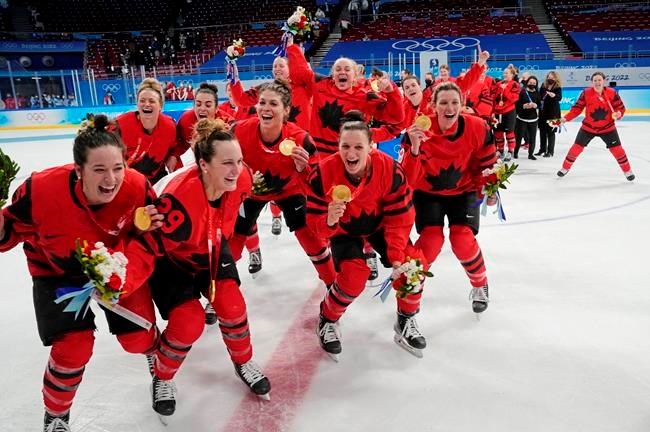Canada's women's hockey team starts the world championship remembering the words of a man who climbed Mount Everest twice.
Jamie Clarke, a Canadian adventurer who reached the top of the world's highest mountain in 1997 and 2010, spoke to the women's team twice in the weeks leading up to February's Olympic Games in Beijing where the Canadian women reclaimed gold.
"He talked about conquering Mount Everest. One of his messages was, you're only on top for a split second," head coach Troy Ryan said.
A world championship just six months after the Olympic final has the Canadian women battling for international supremacy again. Canada is the reigning world and Olympic champion, having won both titles in the last year.
"Jamie Clarke, when he spoke to us, he really connected with that," Canadian captain Marie-Philip Poulin said.
"He had that whole process to get to the top. It's so rewarding when you get there, but it's about two seconds and then you're back at the bottom and you're back to trying to get back on top.
"We had a great year, we had the world championship, we had the Olympics, we had a moment where we celebrated, but now we're back to work."
The 2022 women's world championship in Herning and Frederikshavn, Denmark, is the first to be held in the same calendar year as an Olympic Games.
Defending champion Canada opens Thursday against Finland at KVIK Hockey Arena in Herning, which is a city of 50,000 people 300 kilometres west of Copenhagen.
The IIHF deemed international women's hockey deep enough to make the world championship a truly annual event instead of skipping it every four years during an Olympics. Another reason for the change is to encourage federations to invest more consistently in their women's teams.
While lower-division women's championships were played in Olympic years of 2014 and 2018, the absence of a top-tier tournament every four years was problematic for promotion and relegation of countries.
A second summer world championship for the women in as many years continues the flux brought on by the COVID-19 pandemic.
The 2020 and 2021 championships in Nova Scotia were both called off, with last year's tournament rerouted to Calgary in August.
Post-Olympic retirements and the short turnaround for countries to prepare for Denmark will be factors for all countries in this year's event.
The 10-country field is minus Russia, banned by the International Ice Hockey Federation for that country's invasion of Ukraine.
Sweden draws back into the championship based on its world ranking.
Canada is in Pool A with U.S., Finland, Switzerland and Japan. Sweden, Czechia, Germany, Hungary and Denmark comprise Pool B.
Poulin scored the overtime winner against the United States in last year's final in Calgary to halt the Americans' run of titles at five straight.
The last time Canada held both world and Olympic titles heading into a world championship was in 2008.
"I don't think there's momentum myself," Ryan said. "I think there's confidence. I don't know how you could come off that year and not be confident.
"We had success last year and a lot of people probably feel you're just picking up where you left off. We have some areas we believe we can improve on, but you also don't want to come into a new year thinking you've got to do things completely differently or substantially differently.
"We're almost approaching our year as we're so proud of so many areas of our game and the way we played, but in those areas there are some upgrades that can be made. For example, our offensive zone play, we were very happy with it, but we shouldn't be satisfied."
Canada has reached the world championship final all but one year since the inaugural tournament in 1990.
The Canadians took the bronze medal in 2019 when they were upset by host Finland in a semifinal.
Canada will host the 2023 women's world championship in April with a location yet to be announced by Hockey Canada.
This report by The Canadian Press was first published Aug. 24, 2022.
Donna Spencer, The Canadian Press




